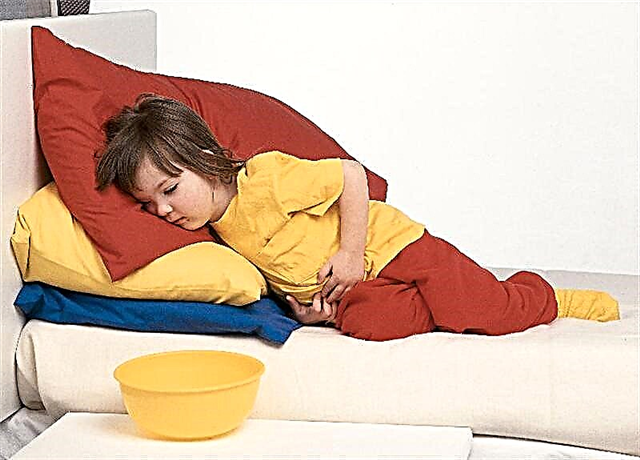When caring for a newborn baby, parents are faced with such baby reactions, the cause of which is difficult to recognize. For example, it is understandable that when a child is crying, he wants to show that he is hungry, feels uncomfortable, or simply requires attention. Quite another thing is unusual behavior, for example, when a newborn pushes and grunts, bends over while sleeping or feeding. Mom begins to worry because she does not understand what is bothering the child.

If the newborn is restless, the cause should be sought
Reasons why a newborn is pushing and grunting
It is not always possible to name the exact reason why a newborn may cry and push. Pediatricians argue that this behavior is natural for babies and should not intimidate parents. Attempts and grunting will not harm the baby if he is on gv or feeding with adapted formulas. When switching to complementary foods, alarming signs of such a condition may appear.
When determining the causes of anxiety for a baby, it is believed that some of them may be completely natural, while others indicate health problems. They are the ones who require medical intervention.
According to experts, a baby's natural groaning often means a desire to communicate with his mother. This can be both a demand for attention and a message about discomfort, for example, uncomfortable clothes or a soiled diaper.
Sometimes, newborns will similarly show dissatisfaction with not having enough milk. This happens if the mother has little milk, or she does not properly latch the baby to the breast.
If the newborn is artificial, it may groan and arch because the small hole in the nipple makes it difficult for the formula to flow properly.
Important! It is up to the parents to determine the cause of the restless behavior and alleviate the condition of the baby. Much in determining the causes depends on the specific situation and accompanying symptoms.
Colic as a cause of pushing
A common cause of grunting is pushing due to increased flatulence, which is quite common in babies. The accumulation of colic gases is due to the adaptation of the newborn's digestive system to a new diet.
Note. Colic tortures babies already in the first week after birth and up to 2-3 months. This is due to the fact that the baby's body is just adapting to the unusual conditions of life and does not always cope with its functions. In addition, the improper food of a nursing woman affects excessive gas production in an infant: fatty, salty, sweet dishes.

Colic in a newborn can be caused by poor maternal nutrition
The baby grunts from constipation
Causes that stimulate colic often cause constipation - a condition in which the baby cannot go to the toilet for more than 2 days, because of this, he can groan and moan. Pediatricians advise against frequent use of laxatives or enemas. It is more useful to wait a little in order to teach the child's body to cope with the problem on its own.
Swallowing air
Experienced mothers know that a newborn is pushing and crying, making characteristic “roaring” sounds if air enters the intestines along with milk. This is sometimes due to an uncomfortable posture while sucking. A proven technique that helps relieve a painful symptom is to give the baby an upright position after feeding.
Manifestation of dissatisfaction
The easiest reason for babies to groan is often the discomfort caused by wet diapers. The kid begins to push, groan, expressing his displeasure and concern.
Note. According to child psychologists, newborns express their emotions in this way, since they still have no other way. Grunting is a specific language of a baby, with the help of which he tries to inform his mother about something.
The baby relieves
Common reasons why a one-month-old baby is constantly pushing and grunting are considered to have bowel movements, as well as getting rid of gases that have accumulated there. Pediatricians explain that in order to perform even simple physiological actions, the baby often needs to make efforts, accompanied by grunting, since the muscles of the tummy are still weak, the work of the digestive and excretory systems is not debugged.
Clogged nose
If your baby sniffs and grunts during sleep, it could be due to a stuffy nose. Dr. Komarovsky explains that a similar condition appears due to the narrow airways in which softening mucus is located, it gets stuck and accumulates. Babies cannot breathe through the mouth, so special attention should be paid to nasal hygiene.

Sniffling and grunting occurs in a newborn with a cold
Why does a newborn push and grunt in a dream
Every mother knows that in a dream, a baby makes peculiar sounds: it can groan, sniff, or push. Sometimes the child can wake up and cry, which means the accumulation of unpleasant sensations in the crumbs. With such sounds in a dream, he can notify parents about a wet diaper, hunger or uncomfortable air temperature for him.
Relieves need
It is much worse when children begin to groan if they cannot go to the toilet. During the day, this is often due to insufficient development of the abdominal muscles, so you have to push hard. At night, during sleep, babies can be disturbed and make grunting gas or heaviness in the stomach. Pediatricians advise to lay the baby on the tummy more often to remove gas and strengthen muscles.
Dry air makes you sniff
Adults are sometimes unaware that even dry air can cause a baby to sniff. Due to the insufficient level of humidity in the room, dry crusts appear in the child's nose. They make breathing difficult, and a peculiar "grunting" sound appears. An adult needs to regularly examine the child's nose and immediately remove the clusters that appear.
Important! It is necessary to maintain a healthy microclimate in the nursery: temperature, humidity and air quality.
Clothing discomfort
Even such a seemingly insignificant fact as improperly selected clothes is a cause of anxiety for the baby. For a baby to sleep well, he needs a comfortable environment. If the baby is too hot or, conversely, cold, his tummy squeezes the diaper, or the seam on the blouse interferes, then the sleep will be restless.
If mom is sure that everything is in order with the baby's tummy, you need to pay attention to his clothes. Perhaps it is because of this that the baby grunts and pushes in a dream, showing a feeling of discomfort with his condition.
Why does a baby grunt and push when breastfeeding
Experts draw the attention of young mothers to the fact that grunting during breastfeeding is a kind of expression of discontent with a child. Poor milk flow from the breast or an uncomfortable position during feeding can cause this irritation. In addition, when sucking on the mother's breast, the child works hard, therefore grunts with zeal and exertion. Mom needs to help the baby, for example, change the position or apply it to the breast in a different way.
Note. During the meal, the body relaxes, so the child may begin to groan. Perhaps he wanted to have a bowel movement at this very moment. Due to the weakness of the abdominal muscles, the urge to use the toilet while feeding is quite natural.

When breastfeeding, the baby may groan from exertion
How to help a child
The mother should help the baby if she hears the characteristic grunting sounds and sees the baby's attempts. First, identify the cause, and second, find a way to eliminate it.
Relief for constipation
For constipation, well-known and well-proven techniques are suitable, for example, laying out the baby on the tummy, light massage of the abdominal muscles, or the exercises "Bicycle", "Butterfly", "Coups". A warm diaper on the tummy helps to relieve flatulence. You can draw your baby's legs up to your stomach or chest to stimulate bowel movements.
Council. If conventional remedies do not help, you need to consult a pediatrician about taking special drugs for constipation.
Colic Relief
In the case of colic, the same methods will help as for constipation. You can add the tips that Dr. Komarovsky offers:
- for a nursing mother to adhere to a sparing diet;
- monitor how many times the baby went to the toilet;
- observe the color and consistency of the child's feces;
- if necessary, do an enema before bedtime.
Dangerous symptoms when to see a doctor
There are situations when harmless grunting and puffing develop into dangerous symptoms. Then it becomes necessary to contact a pediatrician for advice. Adults should be alerted to the characteristic signs of a sick baby:
- Too frequent regurgitation, resembling vomiting;
- The appearance of frequent and loose stools;
- Restless sleep, during which the baby presses its legs to the tummy;
- Temperature rise;
- Bloody streaks in stool.
Important! If the baby cries around the clock and behaves restlessly, while he has a tight tummy, this is a reason to immediately consult a doctor, since such symptoms indicate a disease.
Profuse regurgitation
Pediatricians name other possible reasons why a baby grunts. Often he pushes and "hums" before spitting up, that is, returning the contents of the stomach to the mouth. The baby often has this process after feeding. Parents are sometimes scared that the contents resemble vomiting, and makes them worry about the health of the baby. This is correct, since regurgitation can be associated not only with physiological reasons, but also with painful pathologies.

Groaning can warn of profuse regurgitation
Blood in the stool
Sometimes the cause of the baby's groaning is stool problems. If the mother finds blood in the stool, you should consult a pediatrician and find out what happened:
- With a vigorous condition of the baby, the reason lies in the condition of the mother herself, for example, a crack in the nipples or an excess of breast milk;
- Blood in the stool may be the result of a disease, for example, ARVI;
- Some foods in the diet of a nursing woman (tomatoes, beets) can give baby feces a reddish color;
- Certain medications containing iron that the mother takes cause red streaks in the baby's stool.
Constant crying
If the parents see that the child is pushing and crying all day, you need to remember the last time he went to the toilet. Usually, this condition occurs if the baby has not been emptied for two or more days. In this case, you need to contact a pediatrician who can find and eliminate the cause.
Council. In order not to miss the problem with the stool, it is useful for the mother to keep a diary of the newborn, in which she will record the number of bowel movements per day.
Poor weight gain
Pediatricians warn new mothers that frequent regurgitation can cause poor newborn weight gain. Therefore, special attention should be paid to them. In addition, a situation when the child desperately grunts and pushes while feeding can serve as a signal for a lack of body weight. Often this behavior occurs when there is a lack of milk. In order to prevent weight loss, at a routine examination it is necessary to discuss this issue with the pediatrician, who will explain how to feed the baby.
Frequent loose stools
One of the most obvious reasons a newborn bends over and grunts is due to indigestion. A particularly dangerous condition for a baby is diarrhea resulting from an intestinal infection.
If the doctor did not find any abnormalities, diarrhea may be caused by dietary errors. This is especially true for infants who are bottle-fed.

Massage of the tummy helps the newborn from constipation and intestinal spasms
Refusal to eat
Some mothers notice that during feeding, the baby stops, freezes, as if listening to something, pushes the breast and begins to groan, sticking out its tongue. This refusal to eat worries mom. Experts explain that this is normal. The baby listens to internal processes, focuses to empty herself, or shows a willingness to vomit. In this case, you should leave the baby at the breast and wait until he returns to sucking.
Important! If the child does not take the breast or sucks it sluggishly and throws it away crying, then the situation requires the intervention of a specialist who will advise the best way to teach the baby to breast.
Constant constipation is the reason for grunting
Infants who are on gv rarely have constipation, since breast milk stimulates the digestive system. Artificial babies are often exposed to them.
If a newborn suffers from constipation, then during a bowel movement, he strongly pushes, blushes and “growls”, may even cry, as the attempt to empty the baby brings discomfort. You can always understand that the baby is constipated by the following signs:
- Absence of a chair with gv for more than two days, with artificial - more than a day;
- Feces in the form of peas;
- Baby's tension, pushing and grunting.
Other reasons
If a month-old baby is pushing and groaning around the clock, and this condition is not associated with feeding and emptying the intestines, other reasons are possible. For example, you need to check if his diapers are wet, whether it is comfortable for him to lie in the crib, if everything is in order with his clothes. Perhaps the baby is waiting for mother's affection and attention. It happens that a child behaves anxiously when he is hot, and this is how he tries to show his uncomfortable state. It is believed that grunting helps the baby get used to new living conditions.

Grunting babies can be caused by discomfort from improperly selected clothes
Many babies groan and bend up to six months of age. Why this is happening is not easy to establish in some cases. If the baby eats well, sleeps, develops normally, and the pediatrician does not find alarming symptoms during routine examinations, most likely there is no need to worry. However, it is necessary to provide help to alleviate the child's condition.



